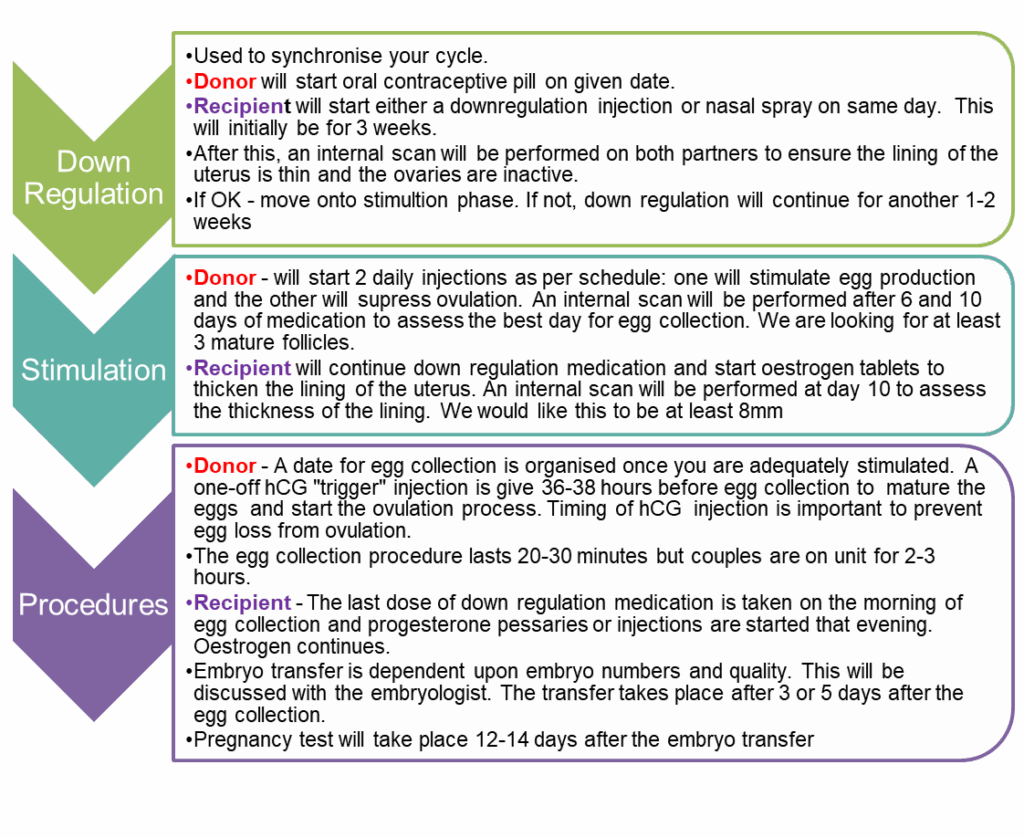Shared motherhood is a relatively new term for egg or embryo donation within a same sex couple. This allows a couple to both feel part of the IVF journey as one partner will produce the egg to be fertilized by donor sperm and the other will have the embryo implanted, carry and give birth to the child.
Initial Stage
To start the process, you will need to attend a presentation with donor co-ordinator to discuss the process and the use of donor sperm or if you are donating embryos, you will discuss the process with a consultant.
Both partners will need to have screening tests performed. Blood tests include HIV, Hepatitis B and C. Vaginal swabs are also performed to rule out any infection e.g., chlamydia.
The partner donating eggs will need to undergo a number of screening blood tests. These include genetic conditions (Karyotyping) and cystic fibrosis. You will also tested for CMV (cytomegalovirus). This virus produces a mild flu like illness in adults but if caught when pregnant it can cause abnormalities in the developing baby. If the donor is immune to CMV they should be matched with a recipient who is also immune to CMV.
The partner donating eggs will require an AMH level. This evaluates your ovarian reserve and will determine if you are suitable to be a donor, and if so, the amount of medication you will need to stimulate the ovaries to produce eggs.
Legal Parenthood
The Human Fertilisation and Embryology Act passed by Parliament (1990) define the mother as the woman who carries or gives birth to a child, irrelevant of any genetic link. Donation, itself, does not give you any legal rights to a child. However, if you are married or in a civil partnership you will automatically be treated as a legal parent. If you are not in either of these, the unit will provide legal paperwork to ensure you both agree to the donor being a legal parent of the child. You are also welcome to obtain your own legal advice. Any “legal parenthood” paperwork must be complete prior to the embryo being implanted. Should the donor wish to withdraw consent, again, this would have to be done prior to embryo transfer.
Counselling
The guidelines issued by the HFEA states ‘that skilled and independent counselling by someone other than the medical practitioner involved in the procedure must be available to the donor’.
The independent counsellor attached to the unit will conduct the sessions. We require that ‘implications’ counselling is provided for a minimum of one session, these sessions are compulsory. These sessions are performed via video call at a time arranged by you and the counsellor.
Costs of Treatment
Any treatment would be on a private basis. A detailed cost of treatment plan will be discussed by the doctor at your consent signing appointment, once we know your blood test results. These results will determine the medication required and this will affect the cost. Payment plans can be discussed directly with the hospital finance department, but they do request for full payment prior to commencing treatment.
Procedure
The partner donating her eggs will undergo the first part of an IVF cycle whilst the partner receiving the embryo will be given medication as if they are having a frozen embryo cycle. A schedule of treatment will be given once all consent forms are completed.

Embryo Donation
If one partner has already undergone a cycle of IVF and has embryos frozen, she can choose to donate them to her partner. Again, screening bloods will need to be performed along with CMV and blood group.
Once all counselling is complete and consent forms are signed, the process can begin.

Useful Websites
HFEA:
www.hfea.gov.uk
Donor Conception Network:
www.dcnetwork.org